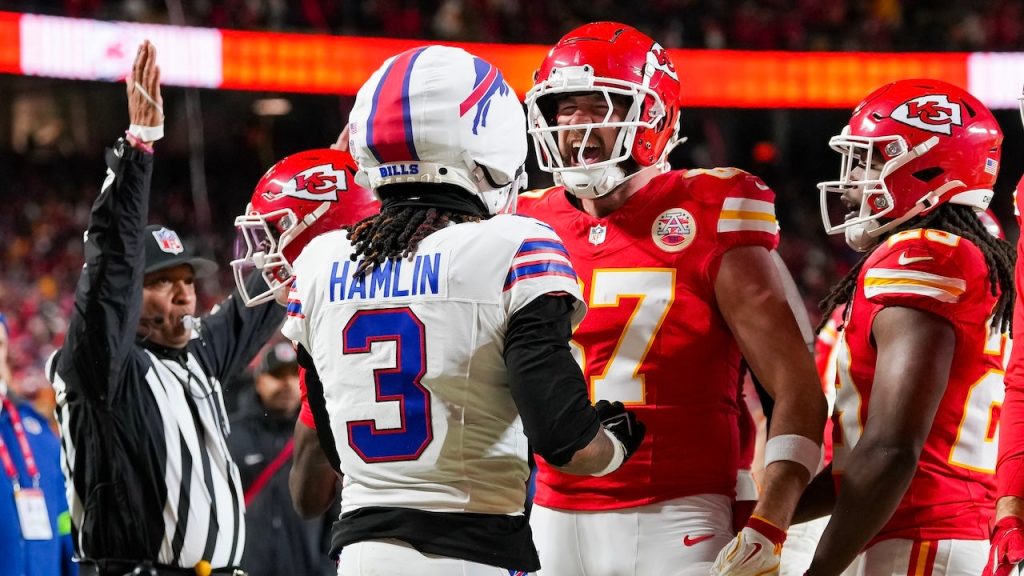The Kansas City Chiefs’ path to Super Bowl LIX was paved not only with impressive victories but also with a trail of controversial officiating decisions and player conduct that ignited debates among fans and analysts. The AFC Championship game against the Buffalo Bills, a nail-biting 32-29 Chiefs victory, served as a microcosm of these recurring themes. Tight end Travis Kelce, a pivotal figure in the Chiefs’ offensive arsenal, found himself at the center of a post-game disciplinary action, receiving an $11,255 fine for taunting. The incident unfolded after a Patrick Mahomes touchdown run in the waning moments of the second quarter, with Kelce engaging in a provocative exchange with Bills safeties Damar Hamlin and Cole Bishop, marked by aggressive head nods and verbal jabs. Despite the presence of multiple referees in close proximity, no unsportsmanlike conduct penalty was called on the field, leaving many to question the officiating consistency.
While Kelce escaped an on-field penalty for his actions, the ensuing reaction from Bills defensive tackle Jordan Phillips resulted in repercussions for both players. Phillips, reacting to Kelce’s taunting, delivered a headbutt to the Chiefs tight end, drawing a 15-yard unnecessary roughness penalty. The league subsequently fined Phillips $6,722 for his retaliatory action. The incident underscored the heightened emotions and tension characteristic of playoff football, while also raising questions about the officials’ ability to effectively manage player conduct and maintain control of the game. The Kelce-Phillips exchange served as just one example of the contentious officiating that characterized the AFC Championship game and fueled post-game discussions.
Beyond the individual player conduct issues, the AFC Championship game was marred by several controversial calls that directly impacted the game’s outcome and ignited a firestorm of criticism on social media and among NFL analysts. One of the most debated calls involved a fourth-down attempt by Bills quarterback Josh Allen in the fourth quarter. Officials ruled Allen short of the first down marker, a decision that effectively ended the Bills’ drive and significantly hampered their chances of mounting a comeback. Replays and subsequent analysis by CBS rules analyst Gene Steratore suggested that Allen may have indeed gained the necessary yardage, further fueling the outrage among Bills fans and raising questions about the accuracy of the officiating.
Adding to the officiating controversy was a second-quarter catch by Chiefs wide receiver Xavier Worthy. Despite video replays seemingly showing the ball touching the ground, officials ruled the play a completed catch. This decision, coupled with the contentious fourth-down call against Josh Allen, created a narrative of perceived bias toward the Chiefs, leaving many fans and analysts questioning the impartiality of the officiating crew. The AFC Championship game was not an isolated incident in terms of questionable officiating involving the Chiefs. The previous week, during the divisional round playoff game against the Houston Texans, two roughing the passer penalties called against the Texans for hits on Patrick Mahomes drew significant criticism.
One of the penalties against Houston came on a third-down play where edge rusher Will Anderson Jr. appeared to make contact with Mahomes’ chest after the quarterback had already thrown an incomplete pass. The second roughing the passer call occurred during a Mahomes scramble, where he slid after evading several defenders. These penalties, deemed questionable by many, sparked criticism from Texans players, head coach DeMeco Ryans, and even ESPN broadcaster Troy Aikman, who called for the league to address the issue in the offseason. The recurring nature of these controversial calls involving the Chiefs fueled speculation about preferential treatment for the star quarterback and raised broader concerns about the consistency and accuracy of NFL officiating.
In the aftermath of these repeated officiating controversies, Mahomes addressed the issue of potential preferential treatment, denying any such bias. He maintained that referees strive to call games fairly and emphasized his focus on playing the game and accepting the results. Travis Kelce, when questioned about the officiating during an episode of his podcast, “New Heights,” with brother Jason Kelce, opted to invoke his right to remain silent, playfully dodging the contentious topic. The confluence of controversial officiating decisions, coupled with player conduct issues like Kelce’s taunting, created a backdrop of controversy surrounding the Chiefs’ playoff run. While these issues did not ultimately derail their Super Bowl aspirations, they served as a recurring point of contention and fueled ongoing debates about officiating consistency and its impact on game outcomes.



